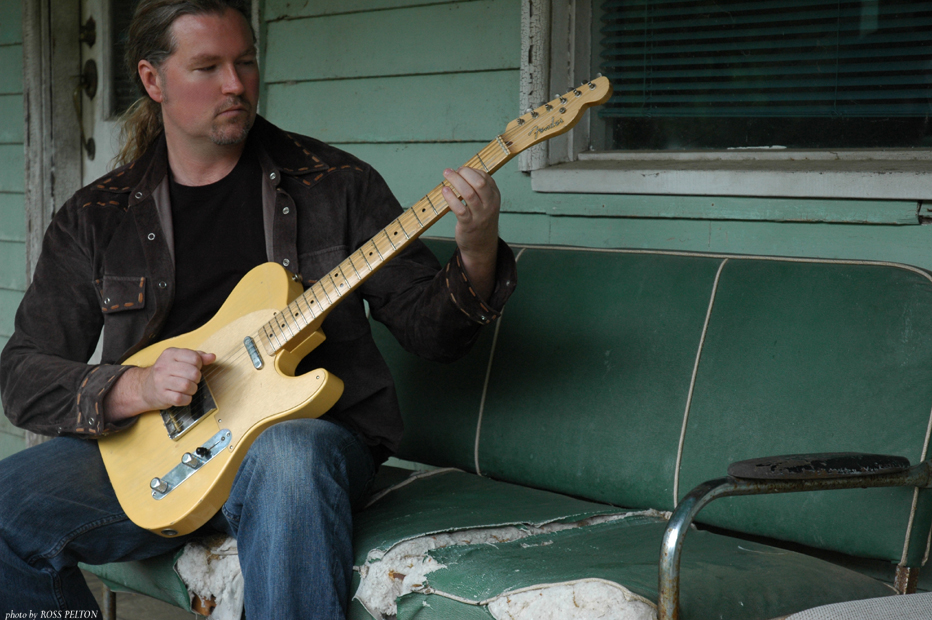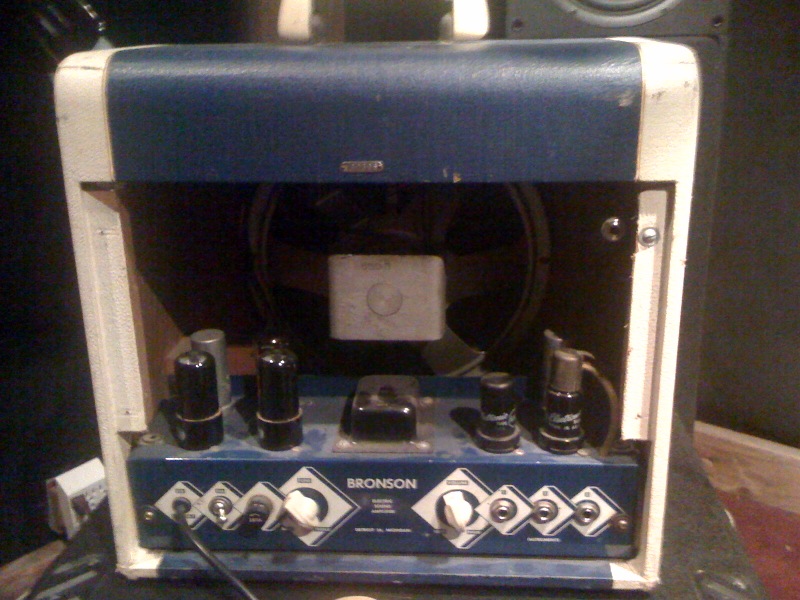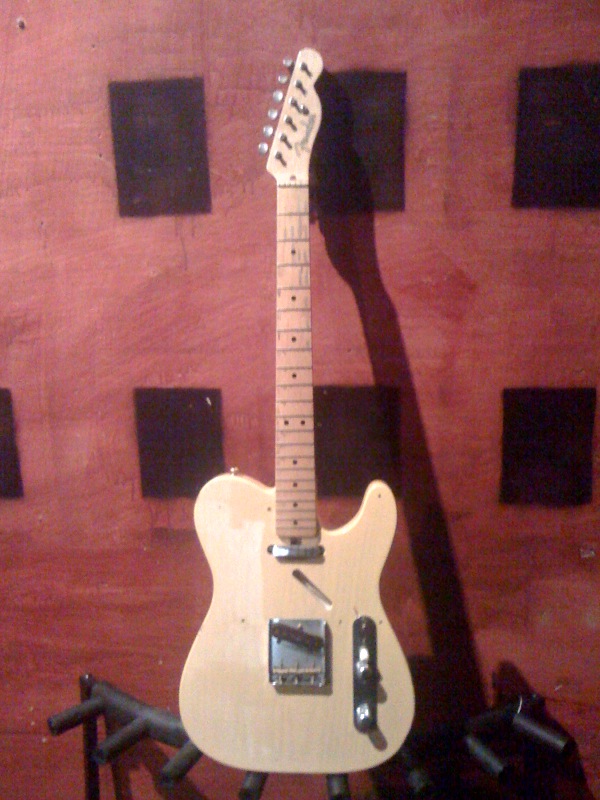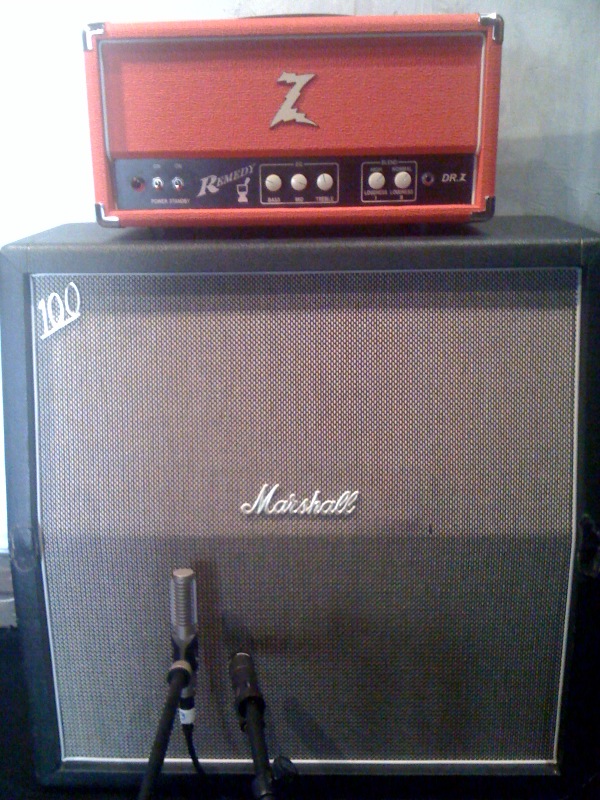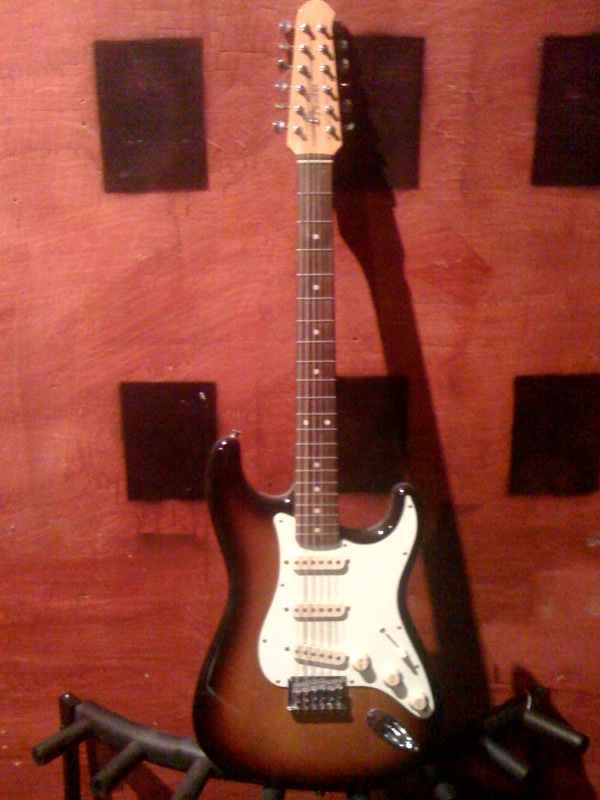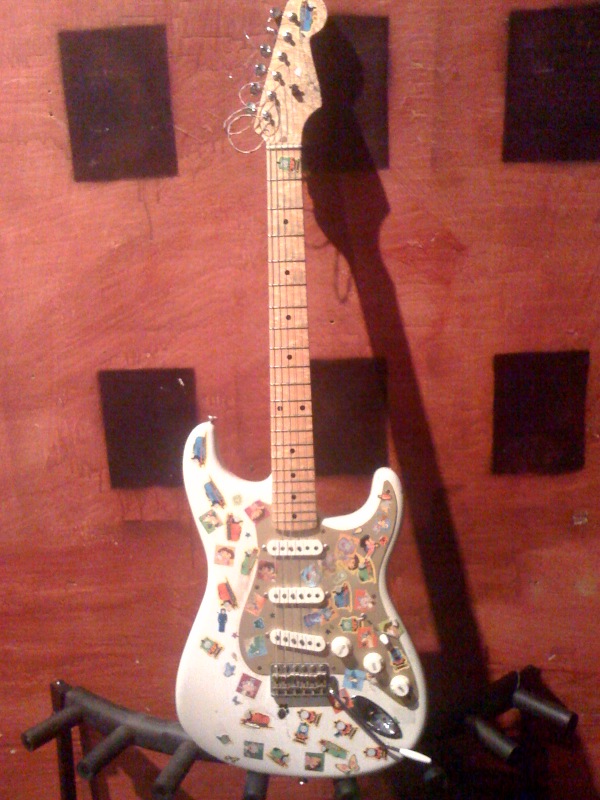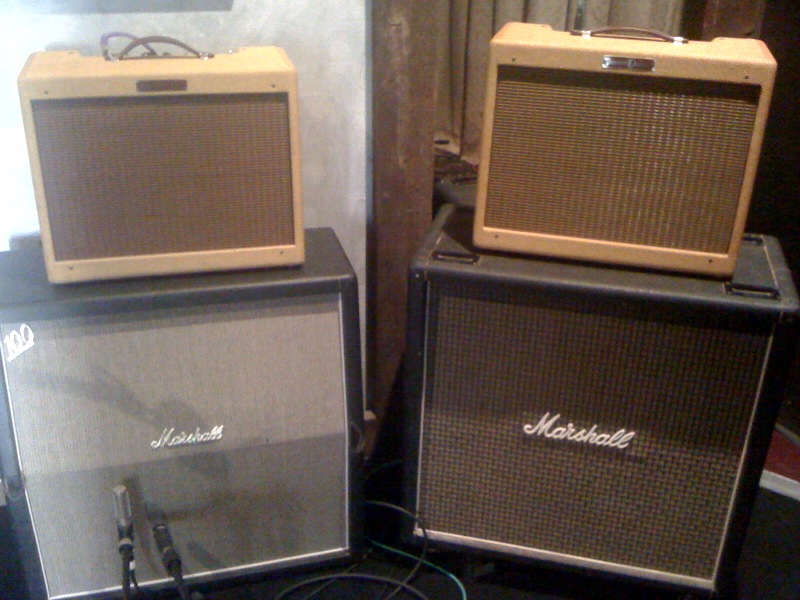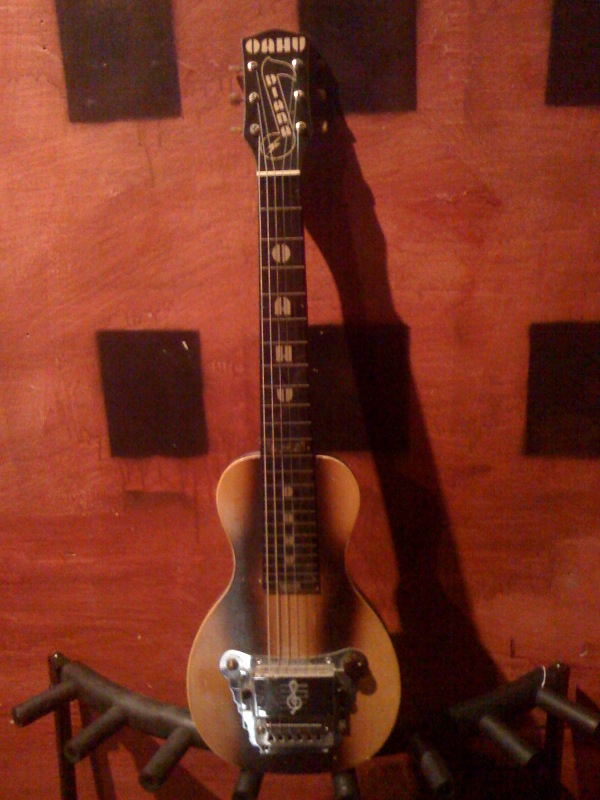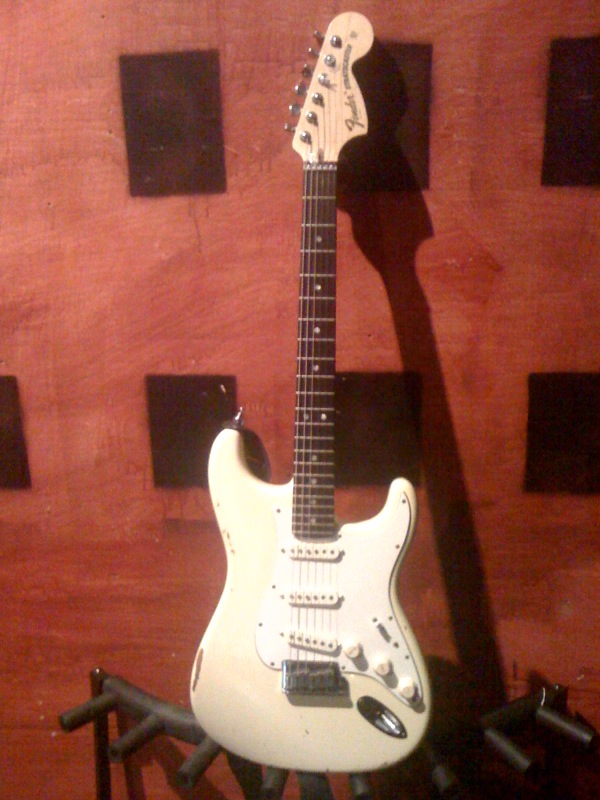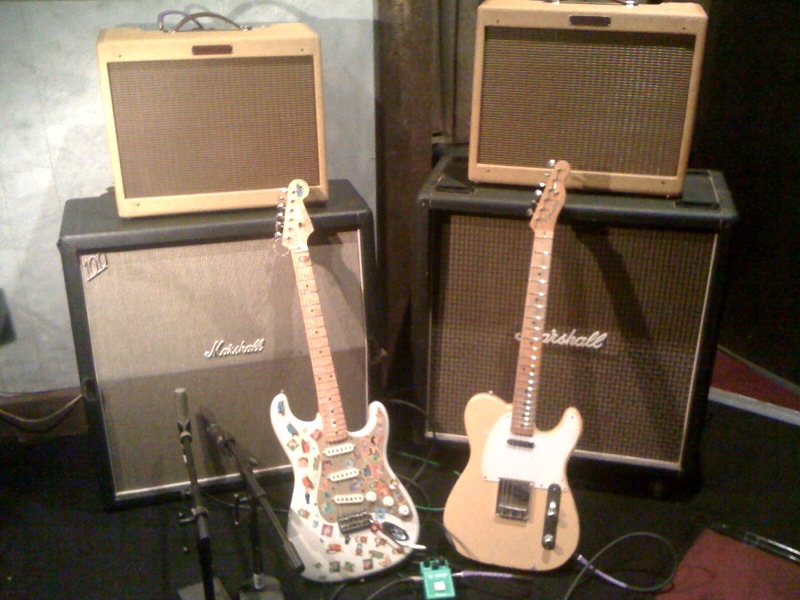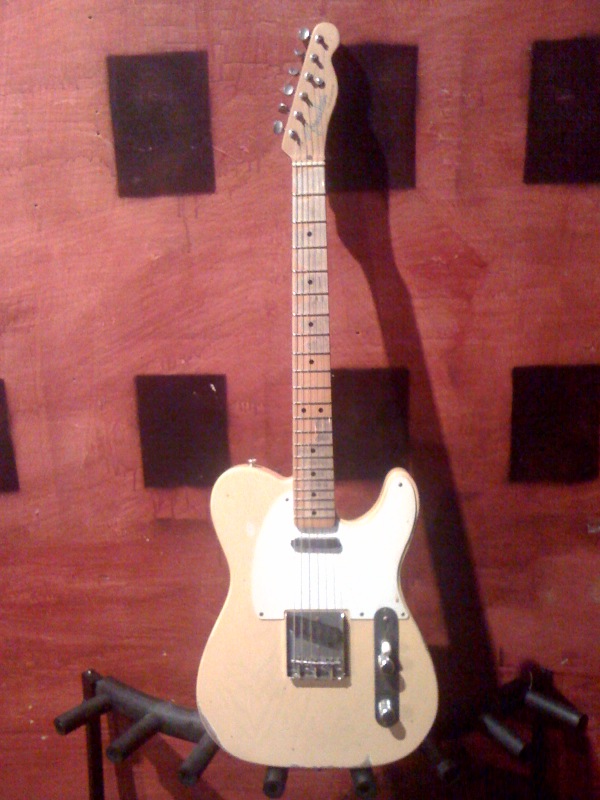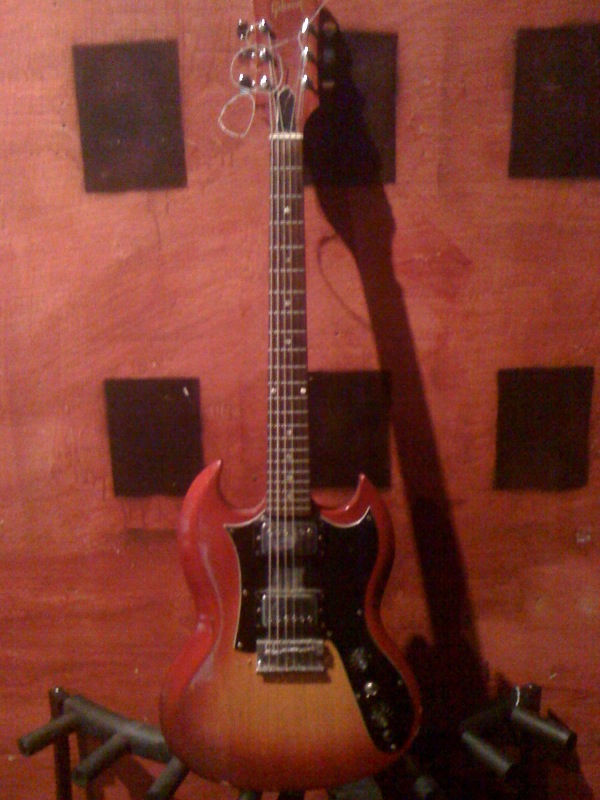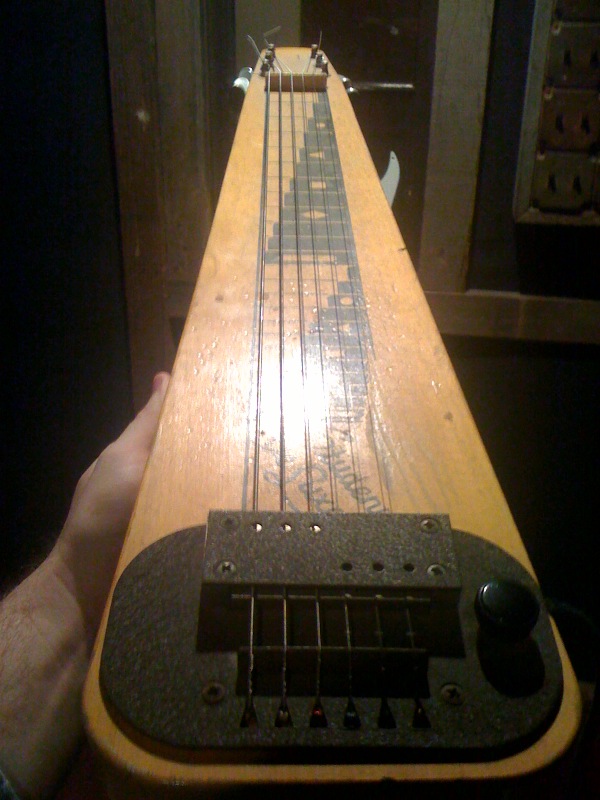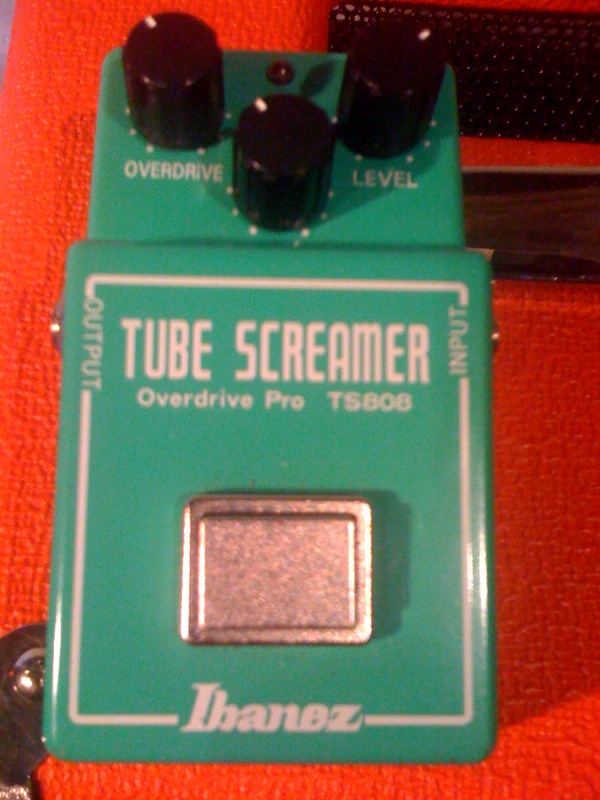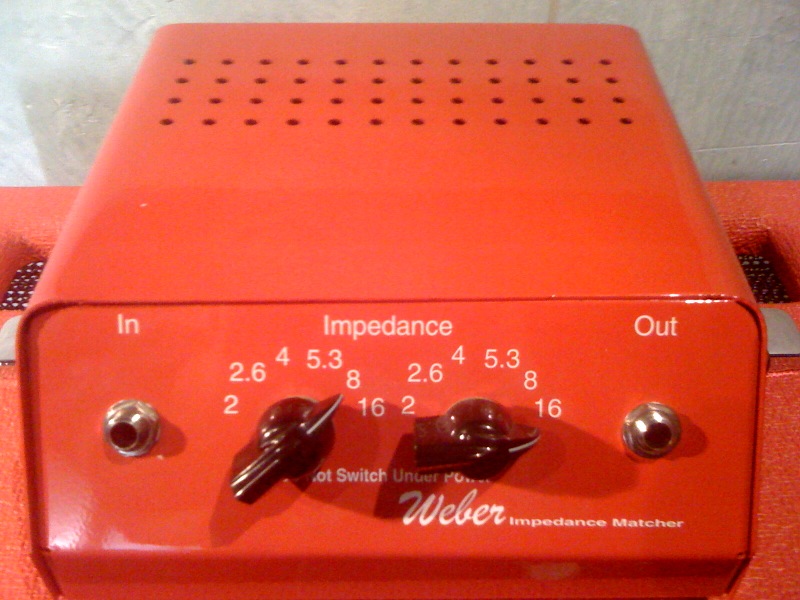Michael Lee Firkins played Paradiso, Amsterdam on november 12, 2009 and after his gig I got a chance to sit down with the Edison-award winning player in his dressing room and speak to an artist that has been a big inspiration to me over the past 20 years.
Copyright Richard Hallebeek and Music Maker 2010. Copying or use elsewhere without the clear approval of the author is strictly prohibited.
:: You played some covers tonight.
I guarantee you.. more originals.. more boring!(laughs)
:: I think it was a good mix for the audience like this with some Hendrix covers and classic rock from the 70’s.
Yeah, well here’s the thing. There’s all kinds of people that like to hear covers.. for some people.. that’s all they wanna hear. Songs that they know, with vocals. Girls.. they don’t understand instrumental music. They don’t even think it exists. WTF? Music without words?? But this is bullshit you know. When we play the shows, when we start playing cover songs with the vocals, the girls are dancing. That’s all they want. You know what I mean. So if you want a transition into a different audience, you gotta start playing other things. Sure, there’s lots of people that just want to hear the instrumentals and come see me, but..eventually you have to, you know.. go beyond that. Cause you know, all those guys that just want to hear the instrumentals, they’re not gonna pay your rent. They’re gonna steal your songs online.
:: And then they will send you an e-mail that they don’t like your last album and should do more this or more that..
(laughs) you need a bigger audience then those guys. I appreciate them and I love playing those old songs, but it’s a tough thing to do. I hope next time we will play different originals, couple of different covers, we gotta find the right combination of songs, but it’s tough. Nobody’s gonna be happy. (laughs)
:: I have been following you ever since that flexi-disc came out in the Guitar Player magazine around ’89 with ‘Laughing Stacks’ on there. I remember that song pretty much floored me. How was that time for you?
I was kind of naive and innocent at the time, so it all just seemed to happen, you know. We recorded a demo and I sent one tape out and.. I sent it to Varney and he enjoyed it and we made up that cd.
:: Your first cd was recorded pretty fast, right?
Well, the idea to do an album came quickly, but I started things slow with the demos. It probably took 6 to 8 months to actually .. before I actually flew out to do the record. When I flew out we did the record and we did it in like, 30 days. With a couple of days off here and there.. it was a good time you know. I used to.. later on, after those years went by, I tried to run away from all that and now I really appreciate the nostalgia. At the time it was great you know.
:: That album went sky-high, that was really great for an instrumental rock album, to do so well.
Yeah, Yamaha helped me out a lot. They were putting out ads everywhere. I toured the whole world, went to Japan, to Australia, to Thailand, all these place.. it was strange you know. The strangest part about it was, that I wasn’t in a band, touring. I was by myself, doing clinics. So I was in all these strange lands, alone. (laughs) that was very weird, you know. That was the one weird thing about it. But it was fun. I do well alone, so.. it was good.
:: I saw you perform in Ahoy, Rotterdam at the time with a backing tape.. around ’94, I guess?
Oh yeah.. you know what, that was actually like.. ’91. The one they gave me the Edison award?
:: Yeah.
Yeah, that was probably ’91, early ’91.
:: You performed to a backing tape and it was amazing. After that first album, it got kinda quiet and you disappeard from the spotlights. I’m not quite sure what happened.
Well, I personally think that whole style of music kinda.. went like that [points down] just like Grunge music came out, put everything away for a while.. and that’s kinda what happened. Plus.. I..
:: You did not release anything for a while.
Yeah. I didn’t release anything for a while. Well, I did a cd with the Howling Iquanas. But that still took to long. Maybe, if I would have followed it up a year later, maybe that would have been the right thing to do. But.. I’m glad I didn’t. I’m glad it went away it did, because.. then I really feel pressured to play more of those originals. (laughs) now I did what wanted to do, so I think it worked out better.
:: I saw you perform live years later and you started working with a vocalist and played a lot of covers.
Yeah, yeah. That was 12 years ago. That was.. I don’t know why I did that at the time, I think like I said, I think there’s a mixed audience, here in Holland, I think there’s guitar fans everywhere, but I think in Holland, the reputation from us is that, they like blues-rock here. So I was trying to cover maybe, a couple of different bases at once. Trying to do that, so.
:: Then you learned to play slide ‘properly’ in the traditional way, so to speak.
Yeah, my dad was lap steel player. And about 7 years ago I started playing those..and wrote a whole bunch of songs with that instrument. It’s coming out next spring and it’s..
:: How do you treat it? You still have your very own style imitating slide guitar with the whammy bar. Like you did here tonight.
I still do that. Yeah.
:: You treat them as a different beast?
Yeah. When you play lap steel, it’s just a whole other instrument. You’re moving like this [points from left to right] it just.. you don’t think it’s different but you play a different rhythm style. So I wrote a lot of songs with that kind of rhythm and I recorded a record with a couple of guys from Government Mule and Chuck Leavell from the Rolling Stones is on the next record. So that’s all like a blues rock, 1957 kindish sounding record.
:: Will you handle the vocal duties yourself?
I’m doing all the vocals, yeah.
:: Also, doing a tour like this Dutch tour, you can keep things pretty compact with the trio.
Yeah, that’s a lot easier, yeah. We’re doing 9 shows in 10 days. Just around Holland. I think when we won that Edison award back then, that made it easier to tour here. Just kind of a gimmick: ‘hey, he won the Edison!’ Maybe that helps you get into a club a little easier. It’s hard you know, doing this kind of instrumenta stuff. I didn’t put out records for a long time, so maybe I faded away in a lot of places. Every five years it’s a whole new audience, so. If you don’t keep up on it, you’re done (laughs)
:: Did you manage to bring your own backline here?
I’m supported by Fender, so they actually gave me the Fender heads and.. we had the Marshall stuff brought in from the backline company. I brought my own ‘Doctor Z’ amp, have you ever heard of those?
:: I know the brand, haven’t really heard the amp.
They sell them here too. That’s just an amp I brought from America, because I didn’t know what was gonna be here, so I brought that and.. it’s 40 watts, weighs 30 pounds, so they’ll extra-charge on a lot of that (laughs)
:: Did you bring any of your own pedals?
Yeah, I have a Keeley-mod tube screamer and then I just.. actually the Fender bandmaster has a delay built into them. So all the delay is coming off the Bandmaster. It’s pretty easy that way.
:: You use a twin setup. Both amps on all the time?
Both amps are on all the time. Delay on one side and then just the dry on the other.
:: You had amazing control over your sound tonight, it looked like you did it just with your volume knob on your guitar.
Well, I’m just kinda moving.. I don’t move the volume knob a lot but I keep moving the pickup selector a lot. So I got kind of a treble, middle, bass kinda thing. For certain parts, that’s the first time I have done that recently, it’s just depending on what amp you play through. If you need to do that, you gotta do that, but..
:: You had a lot defenition in your sound tonight.
Cool, thanks. Well, it’s the bridge pick up on the strat. Which I never thought was usable. But actually, it helps to have that cut, you know.
:: – What was the stickered strat you used tonight?
Ah, my daughter put all those on there (laughs) she decorated a 2700 dollar strat! All by herself!(laughs)
:: What are you working on right now?
Yeah, the one with the members of Government Mule and Chuck Leavell, that comes out in spring and it’s called ‘Since 1967’, that’s really the only one I’m working on besides.. I already have the one after that written. So I’m just waiting to finish this one. That one’s ready to go. And, you know, maybe an instrumental record in between.
:: I think you got your own studio together, right?
Yep. Pro Tools HD and all that, yeah.
:: I thought you used old style tape to record and routed that into Pro Tools?
No, I do have a tape machine there, but it’s not working. I wish it did. It’s a 2″ machine, 16 track, I mean it sounds really good but it’s broke right now. I just go straight into Pro Toold HD right now.
:: OK, I thought you hated digital recording?
[sighs] what can you do? (laughs) I do have a tapemachine there and like to use it someday, but until then, it’s Pro Tools HD. But it sounds pretty good, I mean, HD sounds pretty good, but the higher sample rates help.
:: And if you use the better, more expensive hardware.
Yeah, if you get some other converters, it can sound good.
:: Any new stuff your listening to?
Well, I’ve written a bunch of songs over the years, so I have a pretty big back cataloque of songs. So I always have something I need to have recorded. So what keeps me inspired is, I can’t wait to get to the next batch of songs, it takes so much to record. It takes so long sometimes to record songs by yourself in a studio that by the time you’re done, you can’t wait to get to the next batch of songs.
:: At some point it doesn’t feel fresh anymore.
Yeah, I mean it’s .. I always write while I’m finishing something, while I’m dead in the middle of fnishing something, I start writing other songs.
:: How do you write? On guitar or keys, or..?
I do a little bit of keys, yeah. I used to do everything on the piano before. But now mostly, different tunings and slide, stuff like that helps to write new songs, different keys.
:: Do you generally start from melody, chords or rhythm?
It’s all riff. All riff-based. It usally comes natural though. Most of the main chorus and everything is usually there, sometimes the verses are not, so that’s all I fill in later.
:: I like your song ‘Hawaiian gospel’, a lot of spirit in there.
Yeah, that’s probably.. I always liked that kind of.. it’s similar between country and Hawaiian, kind of similar major 6 kind of flavors. I like all that stuff.
:: Are there any guitar players you’re following right now?
Let me think, sure there is… I can’t think, there’s too many (laughs) You put me on the spot on there (laughs) it’s all old stuff, I pretty much listen to old stuff. 60’s and 70’s and I go through all those phases and when I’m done with that, then it’s nice to then get futuristic and do futuristic stuff and we play like ‘Crying Stacks’, a new song we do.
:: Ah, is that the follow-up to ‘laughing Stacks’?
Yeah (laughs) that song has got kind of a pedal steel minor key acid-space country thing to it and I like stuff like that. So when I’m sick of classic rock, I’ll do something twisted like that and bounce back and forth. But there’s no rules. I mean we’re playing so much these day, we play so many live things lately then I’ll go home and hopefully record and finish the next record. I can’t wait to get back and do some more of those next tunes. So it’s back and forth. Yin and yang! (laughs)
:: How did you prepare for this tour?
We have been rehearsing for all year long, for about a year.
:: Do you play in the States at all with this band?
Yeah, we just started in august. We played four gigs in august and we played one gig right before we came here. And we rehearse a lot. Now we hopefully keep the gigs in motion.
:: Is that possible in the States nowadays?
It is. It depends. For now, we probably won’t start up again till spring time. Early spring. I wanna go home for the holidays, finish my record and as soon as that’s done, we’re gonna try to come back here and play some festivals in may, maybe do like four club gigs and a couple of festivals, that’s where our goal is right now. And then after that hopefully get into Germany as well. Just go right from here into Germany. Germany would be good, lots of gigs there.
:: How did you guys from the band meet?
We met about five years ago, but we actually went to the same grade school, kindergarten, we had the same teacher. We actually had a lot of the same friends, but didn’t know that, until we met. Me and Chris, when we met, we realised we knew every friend of eachothers, but didn’t know eachother. I think it’s because I moved to California 16, 17 years ago. So all my friends started hanging out with him.. he was the replacement (laughs) We could not believe we’ve never met. So we’ve been playing for about five years.
:: So you’re based in California.
I’m in California and in Omaha. My family still lives in Omaha, so I’ll fly back and forth and we rehearse the shows.
:: Do you live in L.A.?
I’m in the San Fransisco area, the bay area. St. Raphael. It’s north of the Golden Gate.
:: Do you play in the local music scene?
No, it’s pretty sad. Sad state of affairs there (laughs) sorry St. Raphael! (laughs) I have lived there for like 17 years, and absolutely NOTHING has gone on there. Not one drummer, not one bassplayer, not one clubgig, nothing. So that’s why I went back to Omaha to play with them.
:: So why did you move there? Was it because of the sunshine?
My record label was based out there. So they hooked me up with a band one time and I flew out and I stayed for a while and met my wife. But the music scene is sad. Doesn’t work. It has helped me out in.. I built a studio, so I do that more. Maybe if there were other things going on, I wouldn’t have done that so much, so.. mother of necessity. More recording, which is good. I like to record.
:: From your first flexi single till the current tour you’re doing, lots of stuff has changed. It’s pretty hard for a small artist to break through now. How do you see the future?
Well, it certainly has changed forever. It’s never gonna come back to what it was. I think for the most part, you just try to find the best things to do. The best thing to come out of all that is youtube. Now you can release a video and everyone sees it, that’s a good thing. Other than that…
:: There’s a lot of stuff on youtube…
Yeah, it’s too much. Everybody has a band now, lot of terrible bands. But there’s nothing you can do. I think live playing is gonna get better because there’s nothing.. nobody is buying cd’s anymore. Live playing gets more valuable I think. We’ll see. We hope to come back to Holland and play more festivals. Come back once a year at least.
Michael Lee Firkins played Paradiso, Amsterdam on november 12, 2009 and after his gig I got a chance to sit down with the Edison-award winning player in his dressing room and speak to an artist that has been a big inspiration to me over the past 20 years.
Copyright Richard Hallebeek and Music Maker 2010. Copying or use elsewhere without the clear approval of the author is strictly prohibited.
:: You played some covers tonight.
I guarantee you.. more originals.. more boring!(laughs)
:: I think it was a good mix for the audience like this with some Hendrix covers and classic rock from the 70’s.
Yeah, well here’s the thing. There’s all kinds of people that like to hear covers.. for some people.. that’s all they wanna hear. Songs that they know, with vocals. Girls.. they don’t understand instrumental music. They don’t even think it exists. WTF? Music without words?? But this is bullshit you know. When we play the shows, when we start playing cover songs with the vocals, the girls are dancing. That’s all they want. You know what I mean. So if you want a transition into a different audience, you gotta start playing other things. Sure, there’s lots of people that just want to hear the instrumentals and come see me, but..eventually you have to, you know.. go beyond that. Cause you know, all those guys that just want to hear the instrumentals, they’re not gonna pay your rent. They’re gonna steal your songs online.
:: And then they will send you an e-mail that they don’t like your last album and should do more this or more that..
(laughs) you need a bigger audience then those guys. I appreciate them and I love playing those old songs, but it’s a tough thing to do. I hope next time we will play different originals, couple of different covers, we gotta find the right combination of songs, but it’s tough. Nobody’s gonna be happy. (laughs)
:: I have been following you ever since that flexi-disc came out in the Guitar Player magazine around ’89 with ‘Laughing Stacks’ on there. I remember that song pretty much floored me. How was that time for you?
I was kind of naive and innocent at the time, so it all just seemed to happen, you know. We recorded a demo and I sent one tape out and.. I sent it to Varney and he enjoyed it and we made up that cd.
:: Your first cd was recorded pretty fast, right?
Well, the idea to do an album came quickly, but I started things slow with the demos. It probably took 6 to 8 months to actually .. before I actually flew out to do the record. When I flew out we did the record and we did it in like, 30 days. With a couple of days off here and there.. it was a good time you know. I used to.. later on, after those years went by, I tried to run away from all that and now I really appreciate the nostalgia. At the time it was great you know.
:: That album went sky-high, that was really great for an instrumental rock album, to do so well.
Yeah, Yamaha helped me out a lot. They were putting out ads everywhere. I toured the whole world, went to Japan, to Australia, to Thailand, all these place.. it was strange you know. The strangest part about it was, that I wasn’t in a band, touring. I was by myself, doing clinics. So I was in all these strange lands, alone. (laughs) that was very weird, you know. That was the one weird thing about it. But it was fun. I do well alone, so.. it was good.
:: I saw you perform in Ahoy, Rotterdam at the time with a backing tape.. around ’94, I guess?
Oh yeah.. you know what, that was actually like.. ’91. The one they gave me the Edison award?
:: Yeah.
Yeah, that was probably ’91, early ’91.
:: You performed to a backing tape and it was amazing. After that first album, it got kinda quiet and you disappeard from the spotlights. I’m not quite sure what happened.
Well, I personally think that whole style of music kinda.. went like that [points down] just like Grunge music came out, put everything away for a while.. and that’s kinda what happened. Plus.. I..
:: You did not release anything for a while.
Yeah. I didn’t release anything for a while. Well, I did a cd with the Howling Iquanas. But that still took to long. Maybe, if I would have followed it up a year later, maybe that would have been the right thing to do. But.. I’m glad I didn’t. I’m glad it went away it did, because.. then I really feel pressured to play more of those originals. (laughs) now I did what wanted to do, so I think it worked out better.
:: I saw you perform live years later and you started working with a vocalist and played a lot of covers.
Yeah, yeah. That was 12 years ago. That was.. I don’t know why I did that at the time, I think like I said, I think there’s a mixed audience, here in Holland, I think there’s guitar fans everywhere, but I think in Holland, the reputation from us is that, they like blues-rock here. So I was trying to cover maybe, a couple of different bases at once. Trying to do that, so.
:: Then you learned to play slide ‘properly’ in the traditional way, so to speak.
Yeah, my dad was lap steel player. And about 7 years ago I started playing those..and wrote a whole bunch of songs with that instrument. It’s coming out next spring and it’s..
:: How do you treat it? You still have your very own style imitating slide guitar with the whammy bar. Like you did here tonight.
I still do that. Yeah.
:: You treat them as a different beast?
Yeah. When you play lap steel, it’s just a whole other instrument. You’re moving like this [points from left to right] it just.. you don’t think it’s different but you play a different rhythm style. So I wrote a lot of songs with that kind of rhythm and I recorded a record with a couple of guys from Government Mule and Chuck Leavell from the Rolling Stones is on the next record. So that’s all like a blues rock, 1957 kindish sounding record.
:: Will you handle the vocal duties yourself?
I’m doing all the vocals, yeah.
:: Also, doing a tour like this Dutch tour, you can keep things pretty compact with the trio.
Yeah, that’s a lot easier, yeah. We’re doing 9 shows in 10 days. Just around Holland. I think when we won that Edison award back then, that made it easier to tour here. Just kind of a gimmick: ‘hey, he won the Edison!’ Maybe that helps you get into a club a little easier. It’s hard you know, doing this kind of instrumenta stuff. I didn’t put out records for a long time, so maybe I faded away in a lot of places. Every five years it’s a whole new audience, so. If you don’t keep up on it, you’re done (laughs)
:: Did you manage to bring your own backline here?
I’m supported by Fender, so they actually gave me the Fender heads and.. we had the Marshall stuff brought in from the backline company. I brought my own ‘Doctor Z’ amp, have you ever heard of those?
:: I know the brand, haven’t really heard the amp.
They sell them here too. That’s just an amp I brought from America, because I didn’t know what was gonna be here, so I brought that and.. it’s 40 watts, weighs 30 pounds, so they’ll extra-charge on a lot of that (laughs)
:: Did you bring any of your own pedals?
Yeah, I have a Keeley-mod tube screamer and then I just.. actually the Fender bandmaster has a delay built into them. So all the delay is coming off the Bandmaster. It’s pretty easy that way.
:: You use a twin setup. Both amps on all the time?
Both amps are on all the time. Delay on one side and then just the dry on the other.
:: You had amazing control over your sound tonight, it looked like you did it just with your volume knob on your guitar.
Well, I’m just kinda moving.. I don’t move the volume knob a lot but I keep moving the pickup selector a lot. So I got kind of a treble, middle, bass kinda thing. For certain parts, that’s the first time I have done that recently, it’s just depending on what amp you play through. If you need to do that, you gotta do that, but..
:: You had a lot defenition in your sound tonight.
Cool, thanks. Well, it’s the bridge pick up on the strat. Which I never thought was usable. But actually, it helps to have that cut, you know.
:: – What was the stickered strat you used tonight?
Ah, my daughter put all those on there (laughs) she decorated a 2700 dollar strat! All by herself!(laughs)
:: What are you working on right now?
Yeah, the one with the members of Government Mule and Chuck Leavell, that comes out in spring and it’s called ‘Since 1967’, that’s really the only one I’m working on besides.. I already have the one after that written. So I’m just waiting to finish this one. That one’s ready to go. And, you know, maybe an instrumental record in between.
:: I think you got your own studio together, right?
Yep. Pro Tools HD and all that, yeah.
:: I thought you used old style tape to record and routed that into Pro Tools?
No, I do have a tape machine there, but it’s not working. I wish it did. It’s a 2″ machine, 16 track, I mean it sounds really good but it’s broke right now. I just go straight into Pro Toold HD right now.
:: OK, I thought you hated digital recording?
[sighs] what can you do? (laughs) I do have a tapemachine there and like to use it someday, but until then, it’s Pro Tools HD. But it sounds pretty good, I mean, HD sounds pretty good, but the higher sample rates help.
:: And if you use the better, more expensive hardware.
Yeah, if you get some other converters, it can sound good.
:: Any new stuff your listening to?
Well, I’ve written a bunch of songs over the years, so I have a pretty big back cataloque of songs. So I always have something I need to have recorded. So what keeps me inspired is, I can’t wait to get to the next batch of songs, it takes so much to record. It takes so long sometimes to record songs by yourself in a studio that by the time you’re done, you can’t wait to get to the next batch of songs.
:: At some point it doesn’t feel fresh anymore.
Yeah, I mean it’s .. I always write while I’m finishing something, while I’m dead in the middle of fnishing something, I start writing other songs.
:: How do you write? On guitar or keys, or..?
I do a little bit of keys, yeah. I used to do everything on the piano before. But now mostly, different tunings and slide, stuff like that helps to write new songs, different keys.
:: Do you generally start from melody, chords or rhythm?
It’s all riff. All riff-based. It usally comes natural though. Most of the main chorus and everything is usually there, sometimes the verses are not, so that’s all I fill in later.
:: I like your song ‘Hawaiian gospel’, a lot of spirit in there.
Yeah, that’s probably.. I always liked that kind of.. it’s similar between country and Hawaiian, kind of similar major 6 kind of flavors. I like all that stuff.
:: Are there any guitar players you’re following right now?
Let me think, sure there is… I can’t think, there’s too many (laughs) You put me on the spot on there (laughs) it’s all old stuff, I pretty much listen to old stuff. 60’s and 70’s and I go through all those phases and when I’m done with that, then it’s nice to then get futuristic and do futuristic stuff and we play like ‘Crying Stacks’, a new song we do.
:: Ah, is that the follow-up to ‘laughing Stacks’?
Yeah (laughs) that song has got kind of a pedal steel minor key acid-space country thing to it and I like stuff like that. So when I’m sick of classic rock, I’ll do something twisted like that and bounce back and forth. But there’s no rules. I mean we’re playing so much these day, we play so many live things lately then I’ll go home and hopefully record and finish the next record. I can’t wait to get back and do some more of those next tunes. So it’s back and forth. Yin and yang! (laughs)
:: How did you prepare for this tour?
We have been rehearsing for all year long, for about a year.
:: Do you play in the States at all with this band?
Yeah, we just started in august. We played four gigs in august and we played one gig right before we came here. And we rehearse a lot. Now we hopefully keep the gigs in motion.
:: Is that possible in the States nowadays?
It is. It depends. For now, we probably won’t start up again till spring time. Early spring. I wanna go home for the holidays, finish my record and as soon as that’s done, we’re gonna try to come back here and play some festivals in may, maybe do like four club gigs and a couple of festivals, that’s where our goal is right now. And then after that hopefully get into Germany as well. Just go right from here into Germany. Germany would be good, lots of gigs there.
:: How did you guys from the band meet?
We met about five years ago, but we actually went to the same grade school, kindergarten, we had the same teacher. We actually had a lot of the same friends, but didn’t know that, until we met. Me and Chris, when we met, we realised we knew every friend of eachothers, but didn’t know eachother. I think it’s because I moved to California 16, 17 years ago. So all my friends started hanging out with him.. he was the replacement (laughs) We could not believe we’ve never met. So we’ve been playing for about five years.
:: So you’re based in California.
I’m in California and in Omaha. My family still lives in Omaha, so I’ll fly back and forth and we rehearse the shows.
:: Do you live in L.A.?
I’m in the San Fransisco area, the bay area. St. Raphael. It’s north of the Golden Gate.
:: Do you play in the local music scene?
No, it’s pretty sad. Sad state of affairs there (laughs) sorry St. Raphael! (laughs) I have lived there for like 17 years, and absolutely NOTHING has gone on there. Not one drummer, not one bassplayer, not one clubgig, nothing. So that’s why I went back to Omaha to play with them.
:: So why did you move there? Was it because of the sunshine?
My record label was based out there. So they hooked me up with a band one time and I flew out and I stayed for a while and met my wife. But the music scene is sad. Doesn’t work. It has helped me out in.. I built a studio, so I do that more. Maybe if there were other things going on, I wouldn’t have done that so much, so.. mother of necessity. More recording, which is good. I like to record.
:: From your first flexi single till the current tour you’re doing, lots of stuff has changed. It’s pretty hard for a small artist to break through now. How do you see the future?
Well, it certainly has changed forever. It’s never gonna come back to what it was. I think for the most part, you just try to find the best things to do. The best thing to come out of all that is youtube. Now you can release a video and everyone sees it, that’s a good thing. Other than that…
:: There’s a lot of stuff on youtube…
Yeah, it’s too much. Everybody has a band now, lot of terrible bands. But there’s nothing you can do. I think live playing is gonna get better because there’s nothing.. nobody is buying cd’s anymore. Live playing gets more valuable I think. We’ll see. We hope to come back to Holland and play more festivals. Come back once a year at least.
Michael Lee Firkins played Paradiso, Amsterdam on november 12, 2009 and after his gig I got a chance to sit down with the Edison-award winning player in his dressing room and speak to an artist that has been a big inspiration to me over the past 20 years.
Copyright Richard Hallebeek and Music Maker 2010. Copying or use elsewhere without the clear approval of the author is strictly prohibited.
:: You played some covers tonight.
I guarantee you.. more originals.. more boring!(laughs)
:: I think it was a good mix for the audience like this with some Hendrix covers and classic rock from the 70’s.
Yeah, well here’s the thing. There’s all kinds of people that like to hear covers.. for some people.. that’s all they wanna hear. Songs that they know, with vocals. Girls.. they don’t understand instrumental music. They don’t even think it exists. WTF? Music without words?? But this is bullshit you know. When we play the shows, when we start playing cover songs with the vocals, the girls are dancing. That’s all they want. You know what I mean. So if you want a transition into a different audience, you gotta start playing other things. Sure, there’s lots of people that just want to hear the instrumentals and come see me, but..eventually you have to, you know.. go beyond that. Cause you know, all those guys that just want to hear the instrumentals, they’re not gonna pay your rent. They’re gonna steal your songs online.
:: And then they will send you an e-mail that they don’t like your last album and should do more this or more that..
(laughs) you need a bigger audience then those guys. I appreciate them and I love playing those old songs, but it’s a tough thing to do. I hope next time we will play different originals, couple of different covers, we gotta find the right combination of songs, but it’s tough. Nobody’s gonna be happy. (laughs)
:: I have been following you ever since that flexi-disc came out in the Guitar Player magazine around ’89 with ‘Laughing Stacks’ on there. I remember that song pretty much floored me. How was that time for you?
I was kind of naive and innocent at the time, so it all just seemed to happen, you know. We recorded a demo and I sent one tape out and.. I sent it to Varney and he enjoyed it and we made up that cd.
:: Your first cd was recorded pretty fast, right?
Well, the idea to do an album came quickly, but I started things slow with the demos. It probably took 6 to 8 months to actually .. before I actually flew out to do the record. When I flew out we did the record and we did it in like, 30 days. With a couple of days off here and there.. it was a good time you know. I used to.. later on, after those years went by, I tried to run away from all that and now I really appreciate the nostalgia. At the time it was great you know.
:: That album went sky-high, that was really great for an instrumental rock album, to do so well.
Yeah, Yamaha helped me out a lot. They were putting out ads everywhere. I toured the whole world, went to Japan, to Australia, to Thailand, all these place.. it was strange you know. The strangest part about it was, that I wasn’t in a band, touring. I was by myself, doing clinics. So I was in all these strange lands, alone. (laughs) that was very weird, you know. That was the one weird thing about it. But it was fun. I do well alone, so.. it was good.
:: I saw you perform in Ahoy, Rotterdam at the time with a backing tape.. around ’94, I guess?
Oh yeah.. you know what, that was actually like.. ’91. The one they gave me the Edison award?
:: Yeah.
Yeah, that was probably ’91, early ’91.
:: You performed to a backing tape and it was amazing. After that first album, it got kinda quiet and you disappeard from the spotlights. I’m not quite sure what happened.
Well, I personally think that whole style of music kinda.. went like that [points down] just like Grunge music came out, put everything away for a while.. and that’s kinda what happened. Plus.. I..
:: You did not release anything for a while.
Yeah. I didn’t release anything for a while. Well, I did a cd with the Howling Iquanas. But that still took to long. Maybe, if I would have followed it up a year later, maybe that would have been the right thing to do. But.. I’m glad I didn’t. I’m glad it went away it did, because.. then I really feel pressured to play more of those originals. (laughs) now I did what wanted to do, so I think it worked out better.
:: I saw you perform live years later and you started working with a vocalist and played a lot of covers.
Yeah, yeah. That was 12 years ago. That was.. I don’t know why I did that at the time, I think like I said, I think there’s a mixed audience, here in Holland, I think there’s guitar fans everywhere, but I think in Holland, the reputation from us is that, they like blues-rock here. So I was trying to cover maybe, a couple of different bases at once. Trying to do that, so.
:: Then you learned to play slide ‘properly’ in the traditional way, so to speak.
Yeah, my dad was lap steel player. And about 7 years ago I started playing those..and wrote a whole bunch of songs with that instrument. It’s coming out next spring and it’s..
:: How do you treat it? You still have your very own style imitating slide guitar with the whammy bar. Like you did here tonight.
I still do that. Yeah.
:: You treat them as a different beast?
Yeah. When you play lap steel, it’s just a whole other instrument. You’re moving like this [points from left to right] it just.. you don’t think it’s different but you play a different rhythm style. So I wrote a lot of songs with that kind of rhythm and I recorded a record with a couple of guys from Government Mule and Chuck Leavell from the Rolling Stones is on the next record. So that’s all like a blues rock, 1957 kindish sounding record.
:: Will you handle the vocal duties yourself?
I’m doing all the vocals, yeah.
:: Also, doing a tour like this Dutch tour, you can keep things pretty compact with the trio.
Yeah, that’s a lot easier, yeah. We’re doing 9 shows in 10 days. Just around Holland. I think when we won that Edison award back then, that made it easier to tour here. Just kind of a gimmick: ‘hey, he won the Edison!’ Maybe that helps you get into a club a little easier. It’s hard you know, doing this kind of instrumenta stuff. I didn’t put out records for a long time, so maybe I faded away in a lot of places. Every five years it’s a whole new audience, so. If you don’t keep up on it, you’re done (laughs)
:: Did you manage to bring your own backline here?
I’m supported by Fender, so they actually gave me the Fender heads and.. we had the Marshall stuff brought in from the backline company. I brought my own ‘Doctor Z’ amp, have you ever heard of those?
:: I know the brand, haven’t really heard the amp.
They sell them here too. That’s just an amp I brought from America, because I didn’t know what was gonna be here, so I brought that and.. it’s 40 watts, weighs 30 pounds, so they’ll extra-charge on a lot of that (laughs)
:: Did you bring any of your own pedals?
Yeah, I have a Keeley-mod tube screamer and then I just.. actually the Fender bandmaster has a delay built into them. So all the delay is coming off the Bandmaster. It’s pretty easy that way.
:: You use a twin setup. Both amps on all the time?
Both amps are on all the time. Delay on one side and then just the dry on the other.
:: You had amazing control over your sound tonight, it looked like you did it just with your volume knob on your guitar.
Well, I’m just kinda moving.. I don’t move the volume knob a lot but I keep moving the pickup selector a lot. So I got kind of a treble, middle, bass kinda thing. For certain parts, that’s the first time I have done that recently, it’s just depending on what amp you play through. If you need to do that, you gotta do that, but..
:: You had a lot defenition in your sound tonight.
Cool, thanks. Well, it’s the bridge pick up on the strat. Which I never thought was usable. But actually, it helps to have that cut, you know.
:: – What was the stickered strat you used tonight?
Ah, my daughter put all those on there (laughs) she decorated a 2700 dollar strat! All by herself!(laughs)
:: What are you working on right now?
Yeah, the one with the members of Government Mule and Chuck Leavell, that comes out in spring and it’s called ‘Since 1967’, that’s really the only one I’m working on besides.. I already have the one after that written. So I’m just waiting to finish this one. That one’s ready to go. And, you know, maybe an instrumental record in between.
:: I think you got your own studio together, right?
Yep. Pro Tools HD and all that, yeah.
:: I thought you used old style tape to record and routed that into Pro Tools?
No, I do have a tape machine there, but it’s not working. I wish it did. It’s a 2″ machine, 16 track, I mean it sounds really good but it’s broke right now. I just go straight into Pro Toold HD right now.
:: OK, I thought you hated digital recording?
[sighs] what can you do? (laughs) I do have a tapemachine there and like to use it someday, but until then, it’s Pro Tools HD. But it sounds pretty good, I mean, HD sounds pretty good, but the higher sample rates help.
:: And if you use the better, more expensive hardware.
Yeah, if you get some other converters, it can sound good.
:: Any new stuff your listening to?
Well, I’ve written a bunch of songs over the years, so I have a pretty big back cataloque of songs. So I always have something I need to have recorded. So what keeps me inspired is, I can’t wait to get to the next batch of songs, it takes so much to record. It takes so long sometimes to record songs by yourself in a studio that by the time you’re done, you can’t wait to get to the next batch of songs.
:: At some point it doesn’t feel fresh anymore.
Yeah, I mean it’s .. I always write while I’m finishing something, while I’m dead in the middle of fnishing something, I start writing other songs.
:: How do you write? On guitar or keys, or..?
I do a little bit of keys, yeah. I used to do everything on the piano before. But now mostly, different tunings and slide, stuff like that helps to write new songs, different keys.
:: Do you generally start from melody, chords or rhythm?
It’s all riff. All riff-based. It usally comes natural though. Most of the main chorus and everything is usually there, sometimes the verses are not, so that’s all I fill in later.
:: I like your song ‘Hawaiian gospel’, a lot of spirit in there.
Yeah, that’s probably.. I always liked that kind of.. it’s similar between country and Hawaiian, kind of similar major 6 kind of flavors. I like all that stuff.
:: Are there any guitar players you’re following right now?
Let me think, sure there is… I can’t think, there’s too many (laughs) You put me on the spot on there (laughs) it’s all old stuff, I pretty much listen to old stuff. 60’s and 70’s and I go through all those phases and when I’m done with that, then it’s nice to then get futuristic and do futuristic stuff and we play like ‘Crying Stacks’, a new song we do.
:: Ah, is that the follow-up to ‘laughing Stacks’?
Yeah (laughs) that song has got kind of a pedal steel minor key acid-space country thing to it and I like stuff like that. So when I’m sick of classic rock, I’ll do something twisted like that and bounce back and forth. But there’s no rules. I mean we’re playing so much these day, we play so many live things lately then I’ll go home and hopefully record and finish the next record. I can’t wait to get back and do some more of those next tunes. So it’s back and forth. Yin and yang! (laughs)
:: How did you prepare for this tour?
We have been rehearsing for all year long, for about a year.
:: Do you play in the States at all with this band?
Yeah, we just started in august. We played four gigs in august and we played one gig right before we came here. And we rehearse a lot. Now we hopefully keep the gigs in motion.
:: Is that possible in the States nowadays?
It is. It depends. For now, we probably won’t start up again till spring time. Early spring. I wanna go home for the holidays, finish my record and as soon as that’s done, we’re gonna try to come back here and play some festivals in may, maybe do like four club gigs and a couple of festivals, that’s where our goal is right now. And then after that hopefully get into Germany as well. Just go right from here into Germany. Germany would be good, lots of gigs there.
:: How did you guys from the band meet?
We met about five years ago, but we actually went to the same grade school, kindergarten, we had the same teacher. We actually had a lot of the same friends, but didn’t know that, until we met. Me and Chris, when we met, we realised we knew every friend of eachothers, but didn’t know eachother. I think it’s because I moved to California 16, 17 years ago. So all my friends started hanging out with him.. he was the replacement (laughs) We could not believe we’ve never met. So we’ve been playing for about five years.
:: So you’re based in California.
I’m in California and in Omaha. My family still lives in Omaha, so I’ll fly back and forth and we rehearse the shows.
:: Do you live in L.A.?
I’m in the San Fransisco area, the bay area. St. Raphael. It’s north of the Golden Gate.
:: Do you play in the local music scene?
No, it’s pretty sad. Sad state of affairs there (laughs) sorry St. Raphael! (laughs) I have lived there for like 17 years, and absolutely NOTHING has gone on there. Not one drummer, not one bassplayer, not one clubgig, nothing. So that’s why I went back to Omaha to play with them.
:: So why did you move there? Was it because of the sunshine?
My record label was based out there. So they hooked me up with a band one time and I flew out and I stayed for a while and met my wife. But the music scene is sad. Doesn’t work. It has helped me out in.. I built a studio, so I do that more. Maybe if there were other things going on, I wouldn’t have done that so much, so.. mother of necessity. More recording, which is good. I like to record.
:: From your first flexi single till the current tour you’re doing, lots of stuff has changed. It’s pretty hard for a small artist to break through now. How do you see the future?
Well, it certainly has changed forever. It’s never gonna come back to what it was. I think for the most part, you just try to find the best things to do. The best thing to come out of all that is youtube. Now you can release a video and everyone sees it, that’s a good thing. Other than that…
:: There’s a lot of stuff on youtube…
Yeah, it’s too much. Everybody has a band now, lot of terrible bands. But there’s nothing you can do. I think live playing is gonna get better because there’s nothing.. nobody is buying cd’s anymore. Live playing gets more valuable I think. We’ll see. We hope to come back to Holland and play more festivals. Come back once a year at least.
